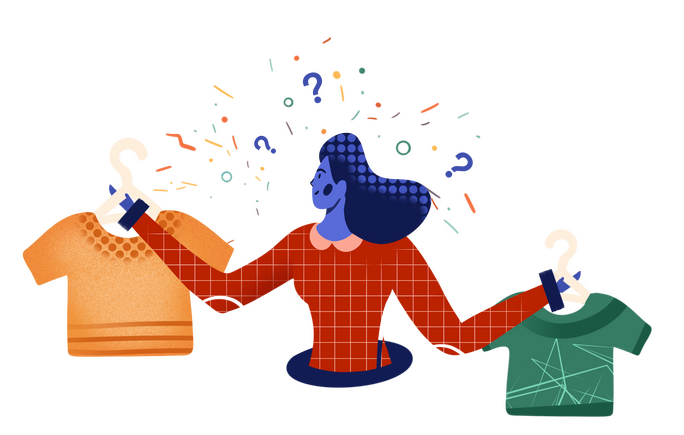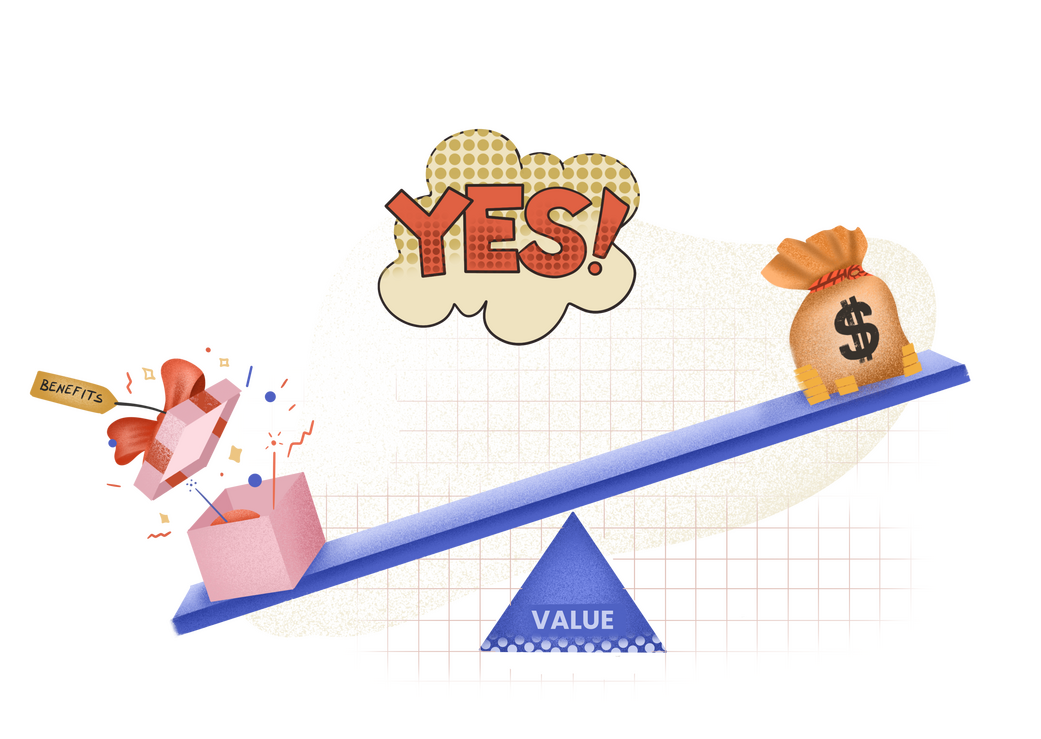They're not just for fun! (Although, let's be honest, they are...that.)
With a continued increase in the number of people shopping online (building on the, shall we say, Corona Boom) has come a commensurate increase in the volume and savvy of eCommerce merchants worldwide. Almost every product is just a click away!
For customers, there’s no commute, no hassle, no pants, and they can get whatever their heart desires, whether it’s down the street or across the literal planet. For merchants, as long as your product is kickass, your website intuitive, and you have tantalizing incentives in place (like free shipping), selling should be easy.
But there is a catch: the more choices shoppers have, the harder it is to make a purchase decision. It’s called The Paradox of Choice, and it can be a major thorn in the side of retailers.
Lucky for you, any time potential buyers are struggling to pick the right product, you have an opportunity to step in and help them.
In order to save the day, you’ll have to guide your customers in an engaging and entertaining way. This is where interactive content, such as a product recommendation quiz, comes in.
In this post, we’ll walk you through what a product recommendation quiz looks like, who it’s best suited to, how it can drive revenue, and how you can easily create one for your Shopify store. Let’s dive in!
What is a Product Recommendation Quiz?
It’s a fun and interactive content experience that asks a prospective customer a series of questions, then suggests one or more products based on their answers.
(Like, duh.)
The personalized treatment online shoppers receive from this quiz mirrors the in-store retail experience, where a sales assistant learns about their preferences, then helps them choose the right product.
There are myriad quiz apps in the Shopify app store, but we chose to partner with Octane AI thanks to their robust quiz analytics and supporting suite of products.
When to Use Product Recommendation Quizzes
While product recommendation quizzes are a great addition to almost every eCommerce website, there are a couple of use cases where they truly shine.
High Involvement Purchases
Whenever a customer has to invest more of something into a purchase decision – whether it’s money, time, or effort – the odds of a sale decrease. It’s the difference between “low involvement” and “high involvement” purchases, and it’s an important consumer behavior concept for merchants to understand.
“Low involvement” purchase decisions are typically made quickly and with little thought, and the hallmarks include low price, little material differentiation from competitors (Coke v Pepsi, for example), impulse buying, and repeat purchases.
Product recommendation quizzes are a perfect tool for high involvement purchases.
Products with Steep Learning Curves
Some products require more careful assessment and expertise than others, especially those that may be significantly different from their competitors. For example, if a buyer is considering a complex knife sharpener from Wicked Edge, an impulsive purchase wouldn’t be prudent.
Lucky for this curious culinaire, Wicked Edge has a product recommendation quiz.
The goal of these quiz questions is to understand customers’ preferences, interests, or buying habits to better match them with specific products in Wicked Edge’s inventory.
It starts by asking if the shopper is interested in sharpeners or accessories, since each group requires a different set of follow-up questions. From there, it asks about how they intend to use the product, their preferences on how they want their finished knives to look, if they’re interested in bundles, and more.
At the end of the quiz, a product or two is recommended based on their answers, along with the option to purchase.
Wicked Edge sharpeners would be considered a “high involvement” purchase because they’re highly differentiated from other brands (have you ever encountered a knife sharpener that looks like that?), not easy to understand at a first glance, and at a higher price point. High involvement purchases engender more risk: What if I buy the wrong kind of sharpener for my knives? What if I don’t understand how to use it, and regret my pricey purchase? What if I don’t get the right accessories?
The product recommendation quiz (and the robust knowledge base) solves virtually all of those concerns by delivering a customized recommendation that meets the shopper’s needs, successfully reducing friction in the purchase decision journey and increasing AOV by recommending appropriate accessories the user may not have discovered otherwise.
Products with Potential Future Risk or Regret
In some cases, merchants offer products that seem relatively straightforward on the surface, but if the wrong choice is made at the point of purchase, could lead to risk or regret further down the line.
Running shoes are a great example. Unlike Wicked Edge’s sharpeners, everyone can identify a running shoe at first glance – but choosing the right one for your activity is not so simple. There are lots of variables to consider that may not be obvious on the surface – foot width, degrees of desired ankle support, sole firmness, arch support, and more.
The risks of choosing wrong can cause serious injury and joint damage over time, which could leave a sour taste in the customer’s mouth. Brooks Running avoids this risk right from the start with a shoe finder quiz to help customers find the perfect shoe for their needs.
This quiz asks for details related to a prospect’s running habits, the purpose of running, foot position, any history of injuries, cushion preference, and much more. Without a quiz, runners – particularly novice ones – might not even know what questions they should be asking, let alone how to choose the correct shoe.
Not only does the quiz help customers find the pair that’s right for them, but it also positions Brooks Running as a friendly, helpful expert, committed to supporting you in your physical fitness and training goals. Shoppers walk away feeling more knowledgeable and confident in their purchase decision.
Companies with A Lot of SKUs
Customers certainly appreciate a vast selection of products, but too much choice can also be overwhelming and complicate their purchase decision. (Paradox of Choice, remember?)
Merchants who sell a lot of products and want to avoid information overload should consider using a product recommendation quiz. Presenting customers with curated choices reduces the decision fatigue of an overwhelming inventory.
Case in point: Sephora, a beauty brand with literally thousands of skincare products.
The company helps shoppers pick the right skincare product using a Skincare Finder quiz. The quiz even offers guidance based on problem areas or product type, making the process even more convenient.
Sure, you could just use the filters provided on the site, but that’s 1) more cumbersome than being spoon-fed exactly what you need by answering a small handful of questions and 2) b-o-r-i-n-g.
(P.S. Gamification is another reason product recommendation quizzes work so well.)
Depending on their answers, the quiz recommends two or three products best suited for them — a much better experience than sifting through thousands of products in the catalog.
How Product Recommendation Quizzes Drive Sales
More and more online stores are exploring product recommendation quizzes as a way to increase profits and provide personalized experiences to shoppers. Here’s how these quizzes help improve sales.
Boost Average Order Value (AOV)
A product recommendation quiz can recommend more than a single item! It can actually promote a collection of related products, so shoppers can add an entire bundle to their shopping cart. (It’s called upselling, ladies and germs.) When customers purchase more products per transaction, it increases their average order value -- which is a critical contributor to eComm success.
In most cases you’ll need a third-party app to bundle products together, but sometimes this isn’t ideal – it’ll create a new SKU, and can create problems in your inventory management if it fails to track units sold individually and as part of the bundle.
Octane AI has an easy way around this. Merchants can create artificial bundles as part of the results page, grouping items together into a “bundle” that can be added to the cart with a single “Add All to Cart” button – but remain as individual line items through checkout. No need for additional apps, zero impact on existing inventory systems. Yeah!
Gather Data About Your Customers
80% of customers want personalized experiences, but gathering customer data for personalization can be expensive for your online store. In fact, two-thirds of marketers say getting adequate data is their biggest hurdle.
Luckily, 83% of customers are open to sharing their data if it will provide a personalized experience, making a product recommendation quiz the perfect way to capture customer data. With the Octane AI/Klaviyo integration, each answer a customer provides can be passed through to Klaviyo as a custom property, meaning you can create highly targeted segments and subsegments based on individual questions.
These data insights are not only used to recommend products to a customer but also to help your business uncover customer problems and solutions. You may even discover an entire customer segment you didn’t know was there!
Sell More with Personalized Follow-ups
The wizardry of personalization doesn’t end with product recommendations. You can also use your quiz data to create personalized follow-up marketing materials.
Not all shoppers will be immediate buyers – some will leave products in their cart for days, and others will simply keep browsing after taking the quiz. Although they didn’t buy immediately, if they completed the quiz, you’ll still have valuable insight into their interests and buying intent.
Using personalized follow-up marketing tactics, like email and SMS, you can nudge them toward a purchase with messaging based on their answers given in the quiz.
Image Source: OctaneAI
The more tailored your messaging, the better chance you have of casual shoppers turning into first-time buyers. Don’t believe us? Spongellé drove $250,000 in 30 days using a combination of a product quiz, targeted SMS messaging, and Facebook messenger campaigns.
Reduce Abandoned Carts
According to a 2021 Statista report, about 80% of shopping carts are abandoned worldwide – an alarming number for any eCommerce website.
A product recommendation quiz can help reduce cart abandonment as well. (Honestly, what can’t a product quiz do?) If your quiz captures the shopper’s email address, there’s an opportunity to send personalized abandoned cart emails using their quiz data. You can also include an incentive, such as a discount code or special offer.
You can even take the manual labor out of this task by simply creating an automated email flow with Klaviyo, to follow up with people who abandon their cart.
Skinny Mixes had great success with this tactic, partnering with Octane AI to implement an automation strategy that helped recover 19% of abandoned carts.
Generate New Leads
Growing your email list and generating leads can be a difficult task for any online business. Consumers are extremely picky with their personal information and think twice before parting with their email address or phone number.
They are likely to share this data only when they are getting something equally valuable in return, such as personalized guidance or recommendations. Generating an email list using a product recommendation quiz is a quick and easy way to turn shoppers into subscribers.
Consider the Millennial favorite eyewear brand Warby Parker. To recommend just the right frames, they offer a simple quiz to learn about shoppers’ style preferences and facial characteristics, with the last question in the quiz asking for their email address.
The value for consumers is easily apparent: if I don’t have time to purchase now and forget what my recommendations were, I can go find them in my inbox. Easy peasy.
(Just make absolutely sure you’re including that opt-in marketing checkbox!)
All of that said…you don’t HAVE to include an email capture field as part of the quiz. The benefits for merchants are obviously tempting, but it’s also a known drop-off point for quiz takers. If you haven’t made the value proposition clear enough before they reach this point, you may lose them.
In that case, give shoppers an opportunity to skip and still get their results, as Warby does. The quiz will still be accomplishing its goals of reducing friction in the purchase decision journey and increasing AOV (if you’ve included bundles as part of your recommendations), even without the cherry-on-top that is the customer email address.
How to Create a Product Recommendation Quiz
Now that you know the benefits of product recommendation quizzes, you may be wondering what it would take to create one for your Shopify store. Do we have good news for you! You can create a totally brand-true, intuitive quiz experience for your shop – without a drop of coding knowledge.
As we mentioned, there are several drag-n-drop quiz builder apps available on the Shopify platform, but we highly recommend Octane AI — an all-in-one product quiz creation platform.
Octane AI provides you a ton of features that help boost sales, such as:
- Ability to sell products directly through the quiz, including “bundles” of products added to the cart as individual line items with the single click of the “Add All to Cart” button
- Dynamic experiences (quiz can adapt to answers in real-time)
- Customizable design to match your branding
- Detailed revenue and analytics tracking
- Integration with other apps like Klaviyo to sync and use quiz data for marketing
Here’s a quick summary of how easy it is to create and embed a product recommendation quiz with Octane AI, step by step.
Add Octane AI to Your Shopify Store
Locate Octane AI in the Shopify apps marketplace and click Add App. You’ll then be redirected to your Shopify dashboard to confirm the installation.
Set Up Your Octane AI Account
Follow the installation process to finish creating your Octane AI account. Next, you’ll connect your Shopify store. If you only have one store, it will connect automatically.
Once your store is connected, Octane AI will ask you to pick a payment plan.
Create a New Product Quiz and Welcome Page
Now you’re ready to create a quiz! Navigate to Shop Quiz in the left menu of your Octane dashboard. Then click New Quiz in the top right corner.
Next, you’ll reach the quiz builder screen, with one page already available:
This is a default page that will show quiz results, since every quiz is required to have at least one results page.
To add questions, click Add Section and select the type of question you want to add, along with possible answers. You can choose whether the answer is formatted as multiple-choice or a free-form text box.
A note on questions: we strongly recommend sketching out your questions in advance, using a tool like Miro, to help visualize the various paths a shopper may take through the quiz and the ensuing products to be recommended.
Add Result Pages
Once you finish adding your questions, it’s time to create a separate result page for each set of answers that lead to a specific product or bundle. Click Add Results Page, then Add Product Block to add the recommended product.
Lastly, you need to set rules to determine when a customer will see each result page. You can set these conditions on the same screen you create the results page.
Save and Embed the Quiz
Now that you’ve added your questions, set up your results pages, and connected them with rules, your quiz is ready to launch. Click Save in the top right corner to confirm your changes.
Octane AI gives you two options to display the quiz in your Shopify store. It can either capture the area between the header and footer (i.e. be embedded into a blank page within your theme), or cover the whole screen. Check out this article for more details.
Let's Get Quizzical
If you’re still on the fence about using interactive content like product recommendation quizzes, it’s time to take the leap. We’ve seen tremendous value in them, from reducing friction in the purchase journey and increasing conversion, to increasing AOV through clever bundles. It combines the engaging power of gamification with the rapport-building potential of personalization. What do you have to lose?
Put product quizzes on your roadmap for 2022, and if you need further help, don’t be a stranger!

















